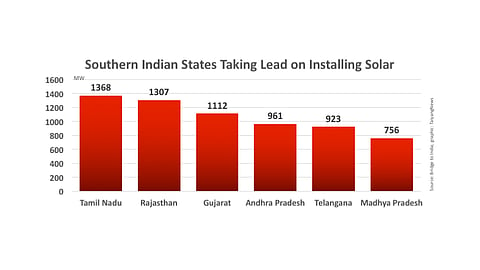South Leads In India PV Capacity
- Southern states in India come on top in terms of solar capacity additions - with Tamil Nadu leading the pack, according to Bridge to India
- In the last 12 months, six states in the country have added 80% of the total PV capacity, while 20% comes from the other 23 states
- In the next two years, Tamil Nadu, Karnataka and Andhra Pradesh are expected to add 60% of the total 14 GW capacity tendered so far
- The concentration of recent solar power capacity installations mostly in southern states is worrying as it shows that other power consuming states are reluctant to quickly add more solar to their portfolio
The Indian state of Tamil Nadu has deseeded the desert state of Rajasthan to become the state with the highest solar power capacity installed in India. At the end of June 2016, Rajasthan led the tally with 1,294.6 MW of PV capacity installed and was followed by Tamil Nadu at 1,267.4 MW (see India PV Capacity By June 2016). On August 22, 2016, clean energy consultancy Bridge to India stated that as of that date, the southern state Tamil Nadu has taken over the top spot with a total installed capacity of 1,368 MW. India's cumulative solar power capacity is reported to be 8.1 GW.
Along with Tamil Nadu, five more states have added 80% of the total PV capacity added in the last 12 months, with the remaining 20% coming from the other 23 states, including Maharashtra, Karnataka and Uttar Pradesh. The 80% capacity comes from three western and central Indian states – Rajasthan (1,307 MW), Gujarat (1,112 MW) and Madhya Pradesh (756 MW), the other three states are located in the South of India – Tamil Nadu (1,368 MW), Andhra Pradesh (961 MW) and Telangana (923 MW).
Until 2014, Rajasthan, Gujarat and Madhya Pradesh added 57% of the total PV capacity. Now, according to Bridge to India analysis, 60% of the 14 GW capacity tenders awarded will come up in South of India in the next two years, a total of 8.7 GW. Karnataka has the largest pipeline of projects, amounting to 3.3 GW.
The consultancy believes this concentration of solar capacity addition in one part of the country points towards the fact that bigger states that consume more power, like Maharashtra, Karnataka and Uttar Pradesh, are 'reluctant' to set up new solar capacities. At the same time, there is an urgent need of ensuring grid balancing and management for sustainable growth of the sector. It says, "The government is planning upgrades of transmission infrastructure through its green energy corridor program, but such projects take much longer than the 12-18 months it takes to commission a solar project. States with high renewable penetration, including Tamil Nadu and Rajasthan, are already facing significant grid curtailment, upsetting project cash flows and return expectations of
investors."
Recently, the Ministry of New and Renewable Energy (MNRE) instructed the Central Electricity Regulatory Commission (CERC) to ensure a 'must run' status to solar power while thermal power projects should be curtailed (see MNRE Backing Solar).


